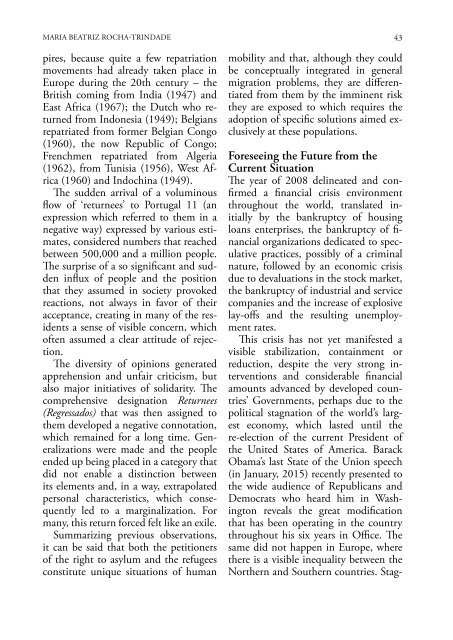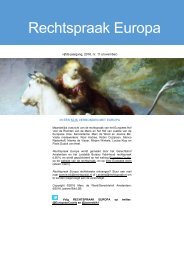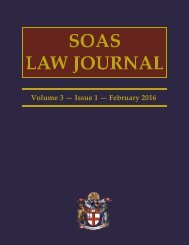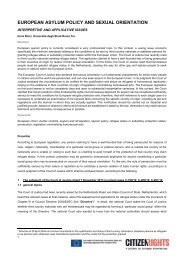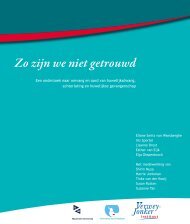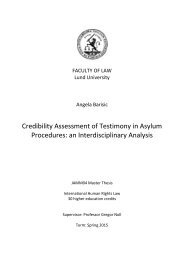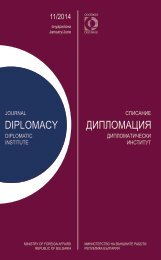AEMI
AEMI-2016-web
AEMI-2016-web
You also want an ePaper? Increase the reach of your titles
YUMPU automatically turns print PDFs into web optimized ePapers that Google loves.
MARIA BEATRIZ ROCHA-TRINDADE<br />
pires, because quite a few repatriation<br />
movements had already taken place in<br />
Europe during the 20th century – the<br />
British coming from India (1947) and<br />
East Africa (1967); the Dutch who returned<br />
from Indonesia (1949); Belgians<br />
repatriated from former Belgian Congo<br />
(1960), the now Republic of Congo;<br />
Frenchmen repatriated from Algeria<br />
(1962), from Tunisia (1956), West Africa<br />
(1960) and Indochina (1949).<br />
The sudden arrival of a voluminous<br />
flow of ‘returnees’ to Portugal 11 (an<br />
expression which referred to them in a<br />
negative way) expressed by various estimates,<br />
considered numbers that reached<br />
between 500,000 and a million people.<br />
The surprise of a so significant and sudden<br />
influx of people and the position<br />
that they assumed in society provoked<br />
reactions, not always in favor of their<br />
acceptance, creating in many of the residents<br />
a sense of visible concern, which<br />
often assumed a clear attitude of rejection.<br />
The diversity of opinions generated<br />
apprehension and unfair criticism, but<br />
also major initiatives of solidarity. The<br />
comprehensive designation Returnees<br />
(Regressados) that was then assigned to<br />
them developed a negative connotation,<br />
which remained for a long time. Generalizations<br />
were made and the people<br />
ended up being placed in a category that<br />
did not enable a distinction between<br />
its elements and, in a way, extrapolated<br />
personal characteristics, which consequently<br />
led to a marginalization. For<br />
many, this return forced felt like an exile.<br />
Summarizing previous observations,<br />
it can be said that both the petitioners<br />
of the right to asylum and the refugees<br />
constitute unique situations of human<br />
43<br />
mobility and that, although they could<br />
be conceptually integrated in general<br />
migration problems, they are differentiated<br />
from them by the imminent risk<br />
they are exposed to which requires the<br />
adoption of specific solutions aimed exclusively<br />
at these populations.<br />
Foreseeing the Future from the<br />
Current Situation<br />
The year of 2008 delineated and confirmed<br />
a financial crisis environment<br />
throughout the world, translated initially<br />
by the bankruptcy of housing<br />
loans enterprises, the bankruptcy of financial<br />
organizations dedicated to speculative<br />
practices, possibly of a criminal<br />
nature, followed by an economic crisis<br />
due to devaluations in the stock market,<br />
the bankruptcy of industrial and service<br />
companies and the increase of explosive<br />
lay-offs and the resulting unemployment<br />
rates.<br />
This crisis has not yet manifested a<br />
visible stabilization, containment or<br />
reduction, despite the very strong interventions<br />
and considerable financial<br />
amounts advanced by developed countries’<br />
Governments, perhaps due to the<br />
political stagnation of the world’s largest<br />
economy, which lasted until the<br />
re-election of the current President of<br />
the United States of America. Barack<br />
Obama’s last State of the Union speech<br />
(in January, 2015) recently presented to<br />
the wide audience of Republicans and<br />
Democrats who heard him in Washington<br />
reveals the great modification<br />
that has been operating in the country<br />
throughout his six years in Office. The<br />
same did not happen in Europe, where<br />
there is a visible inequality between the<br />
Northern and Southern countries. Stag-


